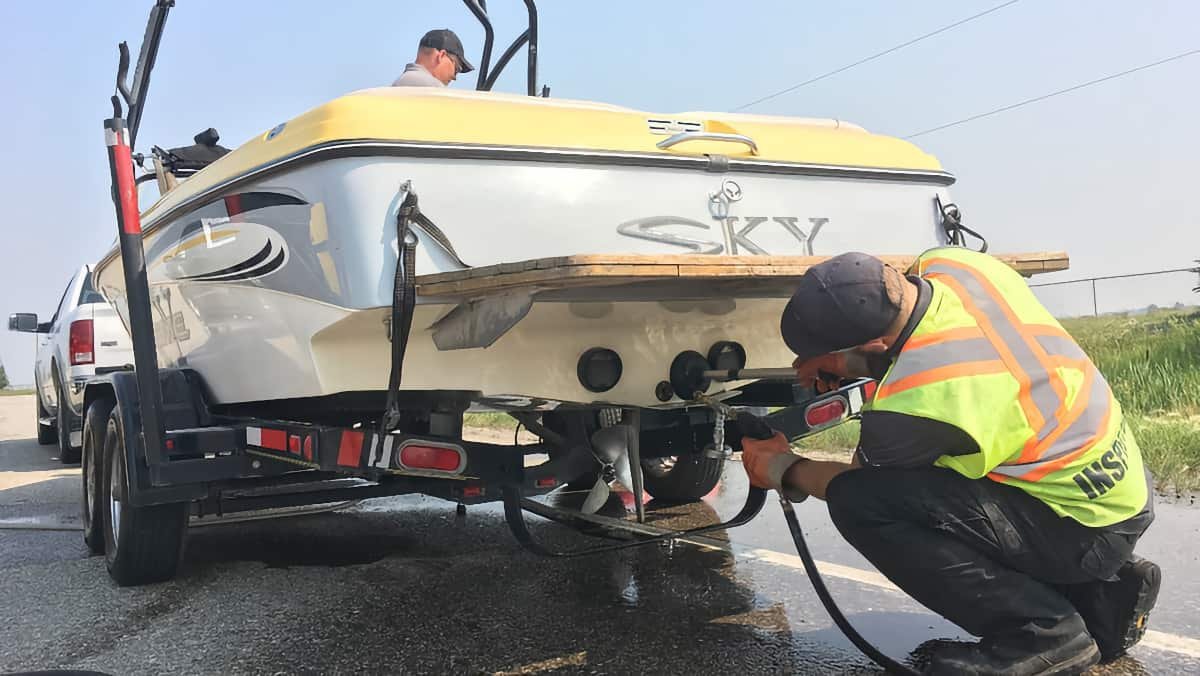Keeping Alberta Invasive Mussel free
Zebra mussels are one of the world’s most invasive aquatic species. These fingernail-sized, freshwater invertebrates have a hardshell and look a bit like a clam.
An infestation of zebra mussels can cause millions of dollars of damage, compromising water intakes, dams, water treatment plants and other infrastructure. Commonly spread by boats travelling across borders, zebra mussels pose a threat to Alberta.
Inspectors decontaminate a boat for invasive species at an inspection station in Alberta (Credit: Government of Alberta)
For nearly 10 years, Alberta’s inspection program has kept Alberta zebra mussel free by inspecting boats at international and provincial borders.
Zebra mussels have been detected in Ontario, Quebec, and Manitoba. Alarmingly, there has been an increase in the spread of zebra mussels in Manitoba and neighbouring Idaho. And recently, Parks Canada moved to restrict watercraft in Alberta’s Waterton Lakes National Park.
In order to confront this growing threat, Alberta’s provincial budget increases the number of inspection stations, inspectors and expands the K-9 dog inspection team.
Our government is also calling on the federal government to require the Canadian Border Services Agency to conduct mandatory inspections and decontaminations of all boats entering Canada from the United States.
Alberta will also launch a new task force to examine further restrictions on transporting boats, increased fines, and other actions that can be taken to build a firewall between this invasive species and our lakes, rivers, and infrastructure.
You can act too. Remember to clean, dry, and drain your watercraft, trailer, and gear and always stop at boat inspection stations, which have been mandatory in Alberta since 2015.
Rebecca Schulz, Minister of Environment and Protected Areas
Quick facts
Once introduced to a waterbody, zebra and quagga mussels are extremely difficult to eradicate and can cause millions of dollars in damage to water-operated infrastructure and harm aquatic ecosystems.
There were significant new detections of invasive mussels in Idaho and Manitoba in 2023.
Parks Canada recently announced that it is closing all bodies of water in BC’s Kootenay and Yoho national parks, and restricting watercraft in Alberta’s Waterton Lakes National Park to slow the spread of invasive species.
Kelowna’s Okanagan-Interior Invasive Mussel Working Group recently formed to address the issue in B.C.
In 2023, Alberta inspected 8,818 boats, 19 of which were confirmed positive for invasive mussels.
17 of the boats were coming from Canadian provinces to the east, namely Quebec, Ontario and Manitoba.
Two of the boats were coming from U.S. states in the Great Lakes region, namely Michigan and Minnesota.
11 of the boats were ultimately heading to final locations in B.C., seven for destinations within Alberta and one for Alaska.
Watercraft inspections have been mandatory in Alberta since 2015. To minimize risk of moving species among waterbodies, it is illegal to transport a watercraft with the drain plug still in place.
The Aquatic Invasive Species Watercraft Inspections and Decontamination Program:
Will operate seven fixed inspection stations and one roving crew during the 2024 boating season.
Will increase the number of dedicated watercraft inspectors to 50, from 35 last year.
Will begin opening stations in April as seasonal staff are hired and onboarded. All stations will be open for May long weekend through the September long weekend, with many extending beyond this period.
All passing watercraft, including non-motorized, commercially-hauled and privately-hauled watercraft, must stop at inspection stations every time, regardless of where they are travelling to or from.
The Fisheries (Alberta) Act lists 52 prohibited aquatic invasive species including fish, plants and invertebrates, as well as has the associated powers for inspection and quarantine when required.

